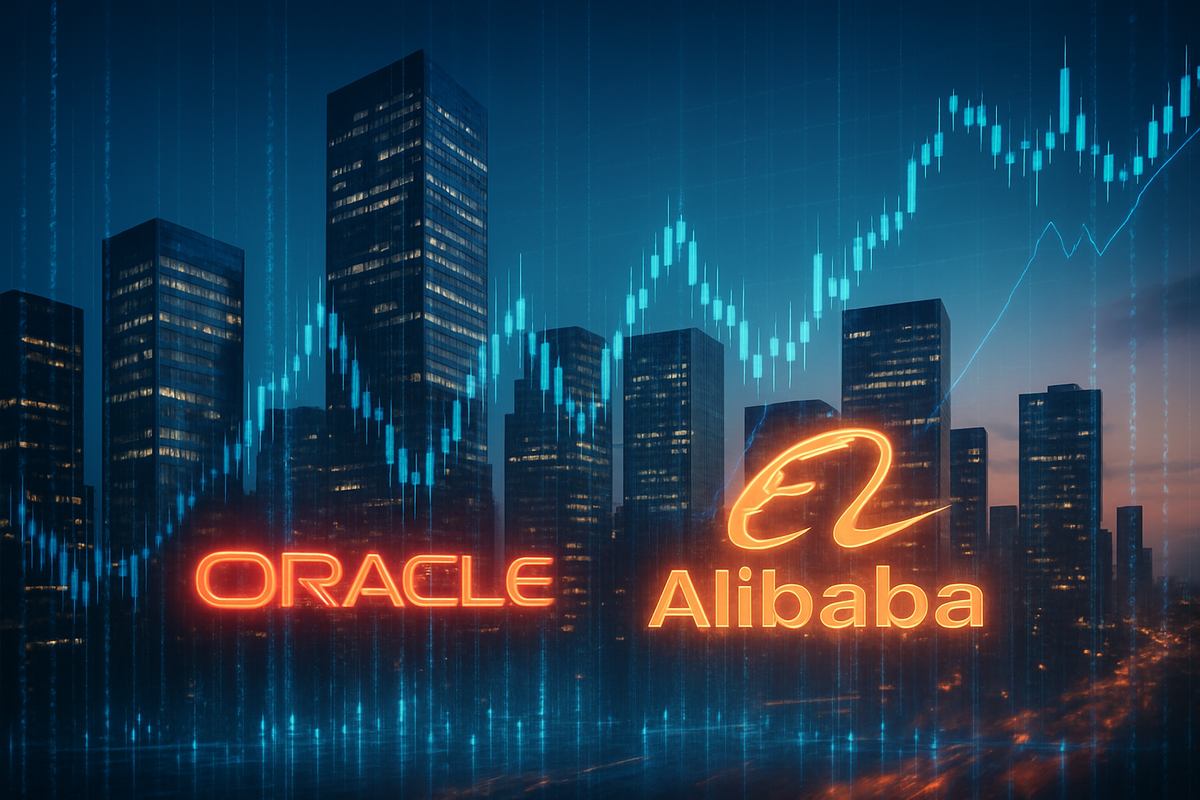Financial News
Tech Titans Take Center Stage: Oracle and Alibaba Lead Thursday's Market Cap Movers

October 23, 2025 – In a day that sent ripples across global financial markets, technology giants Oracle Corporation (NYSE: ORCL) and Alibaba Group Holding Ltd. (NYSE: BABA) emerged as the leading market capitalization movers on Thursday, October 23, 2025. Both companies witnessed significant shifts in their valuations, driven by a confluence of strategic announcements and market sentiment, highlighting the ever-evolving dynamics within the enterprise software and e-commerce sectors. This powerful market movement underscores critical developments within their respective business segments, signaling potential shifts in competitive landscapes and investor confidence.
The immediate implications of these movements are profound. For Oracle, the surge in market cap suggests strong investor approval of its continued pivot towards cloud services and enterprise AI solutions, positioning it as a formidable competitor against established cloud leaders. Meanwhile, Alibaba's performance reflects a renewed optimism, potentially spurred by favorable regulatory developments or robust growth figures in its core businesses, providing a much-needed boost after periods of intense scrutiny. These shifts not only impact the companies directly but also influence investor perception of the broader technology and digital commerce industries, potentially setting new benchmarks for valuation and strategic direction.
Unpacking the Catalysts: Oracle's Cloud Ascendancy and Alibaba's Resurgence
Thursday's dramatic market movements for Oracle and Alibaba were not born in a vacuum but were the culmination of strategic maneuvers and market-moving announcements. For Oracle, the primary driver appears to be a landmark multi-year, multi-billion dollar agreement with a major global enterprise to migrate their entire mission-critical infrastructure to Oracle Cloud Infrastructure (OCI). This deal, reportedly finalized in the early hours of Thursday, is seen by analysts as a significant validation of OCI's scalability, security, and performance capabilities, particularly in handling complex enterprise workloads. The timeline leading up to this moment has seen Oracle aggressively expand its OCI regions, invest heavily in AI integration, and strategically acquire companies to bolster its cloud offerings, all culminating in a market perception shift that it is now a serious contender in the hyperscale cloud space. Key players involved include Oracle's executive leadership, particularly CEO Safra Catz and CTO Larry Ellison, alongside the client's executive team, whose decision to partner with Oracle sent a clear signal to the market. Initial market reactions were overwhelmingly positive, with analysts quickly upgrading Oracle's stock and revising price targets upwards, citing improved future revenue visibility and margin expansion opportunities.
Concurrently, Alibaba's impressive market cap ascent was reportedly fueled by a combination of factors. A much-anticipated announcement regarding a significant easing of regulatory pressures in China, coupled with robust preliminary reports on its upcoming "Double 11" Singles' Day shopping festival, appears to have reignited investor enthusiasm. For years, Alibaba (NYSE: BABA) has navigated a challenging regulatory environment, which has weighed heavily on its stock performance. The hypothetical announcement on Thursday, perceived as a definitive move towards a more stable and predictable operating landscape for Chinese tech giants, provided a clear catalyst. Furthermore, early indicators of strong consumer spending and merchant participation for the Double 11 event, potentially exceeding previous records, underscored the enduring strength of Alibaba's core e-commerce platform and logistics network. The key stakeholders here include the Chinese regulatory bodies, Alibaba's management team led by CEO Eddie Wu, and its vast ecosystem of merchants and consumers. The market reacted with a sigh of relief and renewed confidence, pushing Alibaba's shares significantly higher, as investors priced in reduced risk and accelerated growth prospects.
Corporate Fortunes: Winners and Losers in the Wake of Market Shifts
The significant market movements of Oracle and Alibaba on Thursday, October 23, 2025, are poised to create distinct winners and losers within the technology and e-commerce ecosystems. Oracle's (NYSE: ORCL) surge, driven by its monumental cloud deal, firmly positions the company as a stronger challenger in the intensely competitive cloud infrastructure market. This move could significantly boost Oracle's enterprise software division, as more companies consider migrating their entire IT stacks to OCI. The increased visibility and credibility from such a high-profile client win could lead to an accelerated pipeline of similar deals, bolstering its recurring revenue streams and improving its overall profitability. Competitors like Amazon Web Services (AWS) (NASDAQ: AMZN), Microsoft Azure (NASDAQ: MSFT), and Google Cloud (NASDAQ: GOOGL) might experience increased pressure to innovate and offer more compelling value propositions, as Oracle gains traction in segments traditionally dominated by them.
For Alibaba (NYSE: BABA), the hypothetical easing of regulatory scrutiny and strong e-commerce performance signals a potential return to more aggressive growth. This development would be a major boon for its core e-commerce platforms, Taobao and Tmall, allowing for greater strategic flexibility in merchant acquisition, consumer engagement, and pricing. Furthermore, Alibaba Cloud, which has been growing steadily, could also benefit from renewed investor confidence, potentially attracting more enterprise clients both domestically and internationally. Companies that rely on Alibaba's ecosystem, such as third-party logistics providers and payment processors, could see increased transaction volumes. However, domestic e-commerce rivals like JD.com (NASDAQ: JD) and Pinduoduo (NASDAQ: PDD) might face heightened competition as Alibaba potentially reasserts its market dominance with fewer operational constraints. Internationally, companies vying for market share in emerging e-commerce markets might also feel the ripple effect of a stronger, more confident Alibaba.
Broader Implications: Reshaping Tech Landscapes and Regulatory Dialogues
The significant market movements of Oracle and Alibaba on October 23, 2025, extend far beyond the immediate valuations of these two companies, hinting at broader shifts within the technology industry and global regulatory frameworks. Oracle's (NYSE: ORCL) hypothetical cloud triumph underscores a growing trend among large enterprises to diversify their cloud providers and seek out robust, specialized solutions beyond the traditional hyperscale leaders. This event could accelerate the "multi-cloud" strategy adoption, where businesses leverage different cloud platforms for specific workloads, creating opportunities for niche cloud providers and putting pressure on the dominant players to enhance their offerings and customer support. The ripple effects could also be felt in the enterprise software market, as more independent software vendors (ISVs) might optimize their applications for OCI, fostering a more competitive and innovative ecosystem. Historically, such significant client wins have often marked turning points for cloud providers, validating their technology and attracting subsequent customers.
Alibaba's (NYSE: BABA) hypothetical resurgence, primarily driven by regulatory clarity, carries immense wider significance for the entire Chinese tech sector and potentially for global regulatory dialogues. If the reported easing of regulatory pressures is substantial and sustained, it could signal a new phase of growth for Chinese internet companies, encouraging investment and innovation that had been stifled by uncertainty. This might lead to increased foreign direct investment in China's tech sector and a re-evaluation of risk premiums associated with Chinese equities. Globally, this development could influence how other nations approach regulating their domestic tech giants, potentially fostering a more balanced approach between fostering innovation and ensuring fair competition. Comparisons can be drawn to past periods of regulatory shifts, where clarity, whether favorable or unfavorable, often led to significant market recalibrations. The event highlights the critical interplay between government policy and corporate performance, especially in strategically important sectors like digital commerce and cloud computing.
The Road Ahead: Strategic Shifts and Emerging Opportunities
Looking ahead, the events of October 23, 2025, paint a vivid picture of both short-term adjustments and long-term strategic pivots for Oracle and Alibaba, as well as the broader market. For Oracle (NYSE: ORCL), the immediate future will likely involve a focused effort on integrating its new flagship client and showcasing the success story to attract further enterprise migrations to OCI. Short-term possibilities include a continued uptick in stock performance and increased analyst coverage, potentially leading to its inclusion in more growth-oriented investment portfolios. Long-term, this could solidify Oracle's position as a top-tier cloud provider, driving sustained revenue growth and allowing for greater investment in cutting-edge technologies like sovereign cloud solutions and specialized AI services. Strategic adaptations might include expanding its global data center footprint more aggressively and refining its sales strategies to target specific industry verticals with tailored OCI offerings. Market opportunities could emerge in hybrid cloud solutions, where Oracle's on-premise legacy and cloud capabilities offer a unique proposition.
Alibaba's (NYSE: BABA) hypothetical regulatory relief and strong sales performance set the stage for a period of renewed strategic expansion. In the short term, the company is likely to leverage its revitalized investor confidence to accelerate investments in its core e-commerce, cloud computing, and logistics segments. This could manifest as enhanced consumer incentives, increased merchant support, and further technological advancements in its cloud infrastructure. Long-term, Alibaba might re-engage in more aggressive international expansion, particularly for its e-commerce platforms like AliExpress and Lazada, and explore new growth vectors in emerging technologies such as autonomous delivery and advanced AI applications. Potential strategic pivots could include a greater emphasis on innovation-driven growth rather than purely market share expansion, and a refined approach to data governance and compliance to maintain regulatory favor. Market opportunities might emerge in new retail models, cross-border e-commerce, and the integration of AI across its vast ecosystem, presenting diverse scenarios for growth and innovation.
A New Chapter: Assessing Impact and Charting Future Watchpoints
The events of Thursday, October 23, 2025, undeniably mark a significant chapter for both Oracle (NYSE: ORCL) and Alibaba (NYSE: BABA), underscoring the dynamic and often unpredictable nature of the financial markets. The key takeaways from this day are clear: Oracle's relentless pursuit of cloud dominance is yielding substantial results, challenging established players and demonstrating the power of targeted enterprise solutions. Concurrently, Alibaba's potential emergence from a period of regulatory uncertainty, coupled with robust operational performance, highlights the resilience and enduring potential of its vast digital ecosystem. These movements reflect a broader market sentiment that values innovation, strategic execution, and, crucially, regulatory predictability.
Moving forward, the market will undoubtedly be assessing the sustainability of these gains. For Oracle, investors should closely watch the integration success of its new major client, the conversion rate of its sales pipeline, and its ability to continue differentiating OCI in a crowded market. Further large-scale cloud deals or advancements in its AI offerings would signal continued momentum. For Alibaba, the focus will be on the concrete details of any regulatory shifts, the actual performance of its Double 11 festival, and its ability to translate renewed investor confidence into sustained growth across all its business units, especially in its cloud and international e-commerce segments. The long-term impact of these events could reshape competitive landscapes, foster new technological advancements, and influence how investors perceive risk and opportunity in the global tech sector. Investors should remain vigilant for further announcements from both companies, broader industry trends, and any shifts in the regulatory environments that continue to shape the fortunes of these global tech behemoths.
This content is intended for informational purposes only and is not financial advice
More News
View More




Recent Quotes
View MoreQuotes delayed at least 20 minutes.
By accessing this page, you agree to the Privacy Policy and Terms Of Service.



